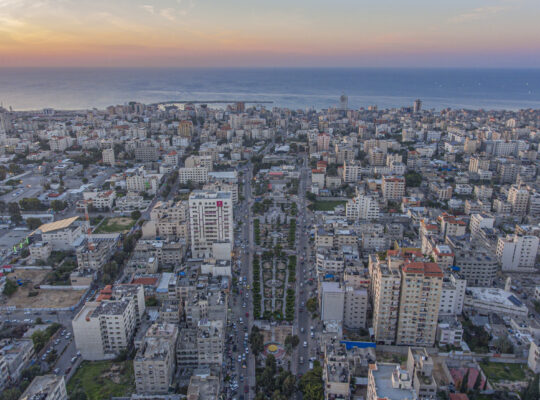[ad_1]
Unlock the Editor’s Digest for free
Roula Khalaf, Editor of the FT, selects her favourite stories in this weekly newsletter.
This article is an on-site version of our Europe Express newsletter. Sign up here to get the newsletter sent straight to your inbox every weekday and Saturday morning
Good morning. EU foreign ministers meet in Luxembourg this morning with conflict raging around the bloc’s periphery. I explain why they need to care how the rest of the world sees it. And our Berlin bureau chief introduces Germany’s new hard-left political movement.
Horror show
Foreign ministers will today be forced to grapple with the conundrum of two regional conflicts, the results of which could dramatically reshape the bloc’s wider neighbourhood.
Context: EU foreign ministers gather in Luxembourg this morning with an agenda packed with bad news: A war in the Middle East that threatens to tear apart the region; 20 months of full-scale conflict in Ukraine; ethnic cleansing in the Caucasus; and tanks on the move in the Balkans.
The EU has never had to deal with so much destabilisation in its near abroad as it does right now, and both its diplomatic abilities and available leverage are either overstretched or ill-suited to the scale of the challenge.
For the first time since February 2022, the ministers won’t start by talking about Russia’s war against Ukraine (which won’t help the trepidation in Kyiv that the west is distracted). They’ll come to that after the Israel-Hamas war.
But the message from the rest of the world over the past two weeks has blended the two wars into one: Why has the plight of the Palestinians not been given the same attention as the plight of the Ukrainians?
At the Cairo peace summit this past weekend, country after country assailed the EU’s representatives (the leaders of Italy, Spain, Greece and Cyprus, plus the EU council president, its chief diplomat and the foreign ministers of France and Germany), according to people present. They were roundly accused of double standards and hypocrisy for condemning Russia’s breaches of humanitarian law, but not Israel’s.
That lack of consistency is geopolitical kryptonite.
Many emerging economies were already sceptical of western demands to oppose Russia’s full-scale invasion in Ukraine, given the 21st century military interventions in Afghanistan and Iraq by US-led coalitions.
So seeing their scepticism confirmed through the ironclad support offered to Israel’s assault on Gaza with mounting civilian casualties has tarnished months of painstaking diplomacy by Brussels and other western capitals with leaders in places such as Johannesburg, Jakarta and Brasília.
Josep Borrell, the EU’s chief diplomat, who will chair today’s meeting, has spent much of the past two weeks warning of this outcome. Having spent most of that time talking to diplomats around the Middle East, he has heard first-hand how Brussels’ reputation has suffered.
For the ministers today, the task is somehow arresting that spiral — and devising a plan to remedy it.
Chart du jour: Dangerous neighbour

Azerbaijan took control of the disputed territory of Nagorno-Karabakh last month, resulting in an exodus of its Armenian population. Residents of southern Armenia — a narrow strip squeezed by Azerbaijan on both sides — now fear they could be next.
Another alternative
It’s been one of the most hotly anticipated political launches in Germany.
Leftwing lawmaker Sahra Wagenknecht will today create a new movement which she hopes will transform Germany’s political landscape and give voters frustrated with both the left and right a new choice, writes Guy Chazan.
Context: Wagenknecht is one of the country’s best-known and most controversial politicians. She used to lead the parliamentary group of Die Linke, a hard-left outfit that emerged from the former East German Communist SED, but announced in March she wouldn’t run for the party in the next Bundestag election.
Today, she will unveil the “Sahra Wagenknecht Alliance”, or BSW. It is seen as the precursor to a fully-fledged political party that could have its debut in June’s European parliament elections, and play a critical role in German regional elections next autumn.
Wagenknecht really has the potential to mix things up. Pollsters say 20 per cent of Germans would consider voting for a party she led.
The reason lies in her broad appeal. After years at the head of Die Linke, the gifted orator and best-selling author moved away from her parties’ orthodoxies, to the consternation of her former comrades.
She questioned Germany’s open-door immigration policy during the refugee crisis of 2015-16, defended anti-vaxxers during the Covid pandemic and strongly opposed German weapons deliveries to Ukraine.
Political scientists say her idiosyncratic brand of leftwing populism could threaten the far-right Alternative for Germany (AfD), appealing to people opposed to immigration and sympathetic to Russia, but who are put off by the AfD’s strident nationalism and its tendency to relativise Germany’s Nazi past.
But critics caution that her previous attempts at mass mobilisation backfired. A previous movement founded by her in 2018 called “Aufstehen” — or stand up — turned into a massive flop which most Germans outside the Berlin bubble barely remember.
What to watch today
-
EU foreign ministers and agriculture ministers meet, separately, in Luxembourg.
-
Officials from the EU and Kazakhstan meet for co-operation council.
Now read these
Are you enjoying Europe Express? Sign up here to have it delivered straight to your inbox every workday at 7am CET and on Saturdays at noon CET. Do tell us what you think, we love to hear from you: europe.express@ft.com. Keep up with the latest European stories @FT Europe
[ad_2]
Source link


 JEWISH DIGITAL TIMES
JEWISH DIGITAL TIMES
